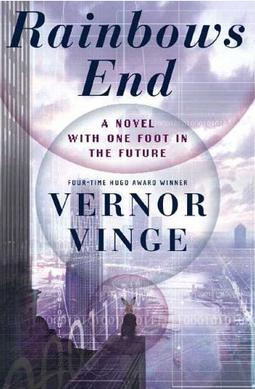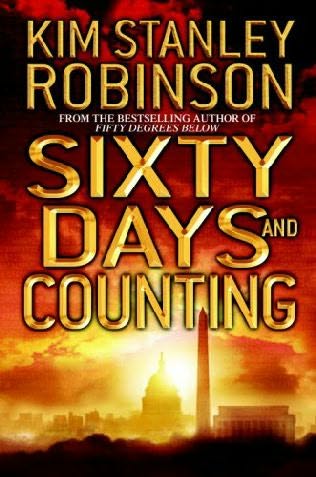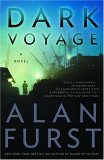"Rainbows End" by Vernor Vinge "The novel introduces us to Robert Gu, a man slowly recovering from Alzheimer's disease thanks to advances in medical technology. As his faculties return, Robert (who always has been slightly technophobic) must adapt to a very different world, where almost every object is networked and mediated-reality technology is commonplace. Robert, formerly a world-renowned poet but with a notoriously mean-spirited personality, must also learn how to change and how to rebuild relationships with his estranged family. At the same time, Robert and his granddaughter Miri are drawn into a complex plot involving a traitorous intelligence officer, an intellect of frightening (and possibly superhuman) competence hiding behind an avatar of an anthropomorphic rabbit, and ominous new mind control technology with profound implications." (Wikipedia)
"The novel introduces us to Robert Gu, a man slowly recovering from Alzheimer's disease thanks to advances in medical technology. As his faculties return, Robert (who always has been slightly technophobic) must adapt to a very different world, where almost every object is networked and mediated-reality technology is commonplace. Robert, formerly a world-renowned poet but with a notoriously mean-spirited personality, must also learn how to change and how to rebuild relationships with his estranged family. At the same time, Robert and his granddaughter Miri are drawn into a complex plot involving a traitorous intelligence officer, an intellect of frightening (and possibly superhuman) competence hiding behind an avatar of an anthropomorphic rabbit, and ominous new mind control technology with profound implications." (Wikipedia)
Well, I have to confess it was a very difficult book to read. I lost all interest in its plot very quickly and kept reading only because of some technological ideas. But in fact it's not worth the time...
Monday, May 19, 2008
"Rainbows End" by Vernor Vinge
Time's Tapestry Series by Stephen Baxter
Time's Tapestry Series by Stephen BaxterIt is incredibly intriguing series of book. I need some time to catch my breath after reading them all...
I wish I understood it earlier in my life that history is not a series of events but rather a strim, a flow of interconnected ideas, views, people, events. We equally are connected to our past and future...
Besides of all these dharmas the books, especially the first three, are very good illustrations to some very interestiong periods in the history of Europe.
Sunday, April 6, 2008
"Sixty Days and Counting" by Kim Stanley Robinson
Sixty Days and Counting" by Kim Stanley Robinson Sixty Days and Counting (2007) is the third book in the Science in the Capital trilogy. including Forty Signs of Rain (2004) and Fifty Degrease Below (2005).
Sixty Days and Counting (2007) is the third book in the Science in the Capital trilogy. including Forty Signs of Rain (2004) and Fifty Degrease Below (2005).
After the Mars trilogy Robinson is on the top of my must-read list. These three books have only strengthened his position there.
Robinson explores the very near future. Something we are going to experience very soon. The main question is what we are going to do there...
"Icehenge" by Kim Stanley Robinson
"Icehenge" by Kim Stanley Robinson " In the 23rd century on Pluto, Icehenge stands at the north pole of the planet. It is a study in ice frozen harder than stone, harder than steel. Each slab towers 200 feet above the crater-pocked surface. The one in the center bears an inscription in Sanskrit. The first mission to Pluto found it there, waiting for them. Is it a starlit message from an alien race? Or does it mark a human mystery? For there was one ship that might have passed this way, forgotten decades ago. The novel incorporates two short stories, "To Leave a Mark" and "On the North Pole of Pluto""
" In the 23rd century on Pluto, Icehenge stands at the north pole of the planet. It is a study in ice frozen harder than stone, harder than steel. Each slab towers 200 feet above the crater-pocked surface. The one in the center bears an inscription in Sanskrit. The first mission to Pluto found it there, waiting for them. Is it a starlit message from an alien race? Or does it mark a human mystery? For there was one ship that might have passed this way, forgotten decades ago. The novel incorporates two short stories, "To Leave a Mark" and "On the North Pole of Pluto""
A distinctive quality of a great SF author is his or her (unfortunately usually his) ability to project past and present into future, however distant, without breaking links between common sense, scientific facts and observations and futuristic ideas.
Sunday, March 16, 2008
"Under Orders" by Dick Francis
"Under Orders" by Dick Francis This is fourth Sid Halley's book.
This is fourth Sid Halley's book.
"Halley's quest for answers draws him even deeper into the darker side of the race game, in a life-or-death power play that will push him to his very limits-both professionally and personally."
I admire Francis's books. I've read practically all of them. However, it seams to me he begins repeating himself. His last tree or four books were not so sparkling as before. But he is still very very good with words.
Saturday, March 15, 2008
"Altered Carbon" by Richard Morgan
"Altered Carbon" by Richard Morgan "Human personalities can be stored digitally and downloaded into new bodies, called sleeves. Most people have stacks in their spinal columns that store their memories. If their body dies, their stack can be stored indefinitely."
"Human personalities can be stored digitally and downloaded into new bodies, called sleeves. Most people have stacks in their spinal columns that store their memories. If their body dies, their stack can be stored indefinitely."
I don't particular like how the book is written, but there is something in the plot that makes me think the is one of the best contemporary science fiction novels. In his interview he explains how the idea of the book first developed.
"It started out from an argument I was having with a Buddhist. The point of conflict was the karma system. He was arguing any suffering you undergo in this life is a direct result of something bad you did in a previous life, which sounds fair until you realise that you can't actually remember any of your previous lives. Then, it suddenly starts to sound existentially pretty fucking unfair. After all, if you can't remember a previous life then to all intents and purposes that life was lived by another person. And why should you be paying for someone else's crimes?"
I don't think Morgan's understanding of the Buddhist's conception of karma is complete, but I still like how he is trying to explore different nuances of the idea and implication of it for the society. Hi view of the later is quite gloomy though.
"Society is, always has been and always will be a structure for the exploitation and oppression of the majority through systems of political force dictated by an élite, enforced by thugs, uniformed or not, and upheld by a willful ignorance and stupidity on the part of the very majority whom the system oppresses."
Well, I understand this sentiment, but I personally have slightly brighter view.
Before I started writhing this note I had not known that there was going to be the "Altered Carbon" film. As well there is a couple of follow-up books, Broken Angels and Woken Furies . I might spend time reading them.
Friday, February 29, 2008
"Dark Voyage" by Alan Furst
"Dark Voyage" by Alan Furst "In the first nineteen months of European war, from September 1939 to March of 1941, the island nation of Britain and her allies lost, to U-boat, air, and sea attack, to mines and maritime disaster, one thousand five hundred and ninety-six merchant vessels. It was the job of the Intelligence Division of the Royal Navy to stop it, and so, on the last day of April 1941 . . ."
"In the first nineteen months of European war, from September 1939 to March of 1941, the island nation of Britain and her allies lost, to U-boat, air, and sea attack, to mines and maritime disaster, one thousand five hundred and ninety-six merchant vessels. It was the job of the Intelligence Division of the Royal Navy to stop it, and so, on the last day of April 1941 . . ."
This is from the book's jacket. Well, this is an example of very good misleading annotation. It is indeed a spy novel, but "Dark Voyage" reaches beyond ordinary "cloak-and- dagger" staff. Alan Furst is considered to be one of the best in evoking period details and characters in his novels set in pre- and WWII Europe. In this one he shows life outside the main WWII protagonist camps - neutral ports and shipping in the Mediterranean and Baltic and everything that comes with that.
I will look for other Furst's books.
"False Impression" by Jeffrey Archer
"False Impression" by Jeffrey Archer
 "Why was an elegant lady brutally murdered the night before 9/11?
"Why was an elegant lady brutally murdered the night before 9/11?
Why was a successful New York banker not surprised to receive a woman's left ear in the morning mail?
Why did a top Manhattan lawyer work only for one client, but never charge a fee?
Why did a young woman with a bright career steal a priceless Van Gogh painting?
Why was an Olympic gymnast paid a million dollars an assignment when she didn't have a bank account?
Why was an honors graduate working as a temporary secretary after inheriting a fortune?
Why was an English Countess ready to kill the banker, the lawyer, and the gymnast even if it meant spending the rest of her life in jail?
Why was a Japanese steel magnate happy to hand over $50 million to a woman he had only met once?
Why was a senior FBI agent trying to work out the connection between these eight apparently innocent individuals?"
Very easy book to read. Full of action and interesting facts about history of art. Besides, I Like Van Gogh's paintings. I didn't use to understand them, but there is nothing permanent in the world including my ignorance...
"Dark Angel" by Geoffrey Archer
"Dark Angel" by Geoffrey Archer"Tom Sedley's idyllic summer vacation in a leafy post war suburb of north London came to an abrupt and shocking end on the 14th September, 1948 when his sister was brutally murdered in woodland near his house. A tramp was arrested for the crime but for the young boy it was the end of childhood and the beginning of a lifelong search to discover what had actually happened that late summer day. Marcus Warwick was Tom's neighbour and best friend but the murder changed their relationship forever: suspicion clouded Tom's mind and they drifted apart. Unknown to each other they were both sent to Korea two years later, Warwick an officer, Sedley as a humble radio man: and when they met in the chaos of war they both had to acknowledge a gulf of distrust and class had opened between the two. Their new relationship was tested in the savagery of the combat that swept up and down the peninsula that first winter. When Tom and Marcus met again it was in combat and it soon became apparent that the one could barely trust the other with his life. The bitterness of what they experienced scarred them for the rest of their lives. Only years later when Tom stumbles across his sister's secret diary do the events of 1948 once more leap into sharp focus and allow him to seek final justice for her murder."
It is a really gripping book. Surprisingly it is nothing of a sort of "Shadow Hunter". There is a crime of course, but Archer concentrates more on what inside character's heads rather than pepper pages with action (there is enough of it though).
"The Sigma Protocol" by Robert Ludlum
"The Sigma Protocol" by Robert Ludlum "The intrigue begins with an American investment banker on vacation in Switzerland who suddenly finds himself the target of an assassin --- a man who had once been a childhood friend. As Ben Hartman is thrown into a race to survive, he begins to uncover evidence of a secret international group that turned the tragedies of World War II into profitable ventures. Sigma was a cooperative of powerful men representing both Allied and Nazi affiliations, and among the men pictured in a damning photograph stood Ben's father, a Jew and a Holocaust survivor. Determined to uncover the truth about his father, Ben soon finds that truth is a chameleon of many colors fading into the background and nearly impossible to distinguish."...(by Ann Bruns)
"The intrigue begins with an American investment banker on vacation in Switzerland who suddenly finds himself the target of an assassin --- a man who had once been a childhood friend. As Ben Hartman is thrown into a race to survive, he begins to uncover evidence of a secret international group that turned the tragedies of World War II into profitable ventures. Sigma was a cooperative of powerful men representing both Allied and Nazi affiliations, and among the men pictured in a damning photograph stood Ben's father, a Jew and a Holocaust survivor. Determined to uncover the truth about his father, Ben soon finds that truth is a chameleon of many colors fading into the background and nearly impossible to distinguish."...(by Ann Bruns)
The review by Ann Bruns I quoted above is quite correct in my opinion. I have not read many Ludlum's books to be able to compare this one to others, but I did like THE SIGMA PROTOCOL. It provoked me to look up a couple of things in the Internet, which I consider as a positive sign.
"Amber Warning" by Robert Ludlum
"Amber Warning" by Robert Ludlum

"Path of The Storm" by Douglas Reeman
"Path of The Storm" by Douglas Reeman
"Hong Kong, 1960s ... The old submarine-chaser USS Hibiscus, re-fitting in a Hong Kong dockyard before being handed over to the Nationalist Chinese, is suddenly ordered to the desolate island group of Payenhau. For Captain Mark Gunnar - driven by the memory of his torture at the hands of Viet Cong guerillas - the new command is a chance to even the score against a ruthless, unrelenting enemy. But Payenhau is very different from his expectations, and as the weather worsens a crisis develops that Gunnar must face alone."
Well, I'd tried to read an Alexander Kent's novel before I came across this one. I hadn't liked it much. It had been something about tall ships etc, but this book captured my attention from the very first page. I'll pay more attentions to his work in future.
"The Black Sun" by James Twining
"The Black Sun" by James Twining
"In London, an Auschwitz survivor is murdered in his hospital bed, his killers making off with a macabre trophy–his severed left arm. In Fort Mead, Maryland, a vicious gang breaks into the NSA museum and steals a second world war Enigma machine, lynching the guard who happens to cross their path... Then three major thefts occur, and suddenly Tom is confronted with a deadly mystery and a sinister face from the past."
Two words- wasted time. The plot is very week and far-fetched. Everything is quite obvious right from the beginning. I would not recommend this book even if you have nothing to do.
"The Teeth of the Tiger" by Tom Clancy
"The Teeth of the Tiger" by Tom Clancy
"In Maryland, Hendley Associates successfully works the stock, bond, and international currency markets. However, in reality the trader business serves as a front because the prime mission of the firm is to root out and eliminate terrorists. United States President John Patrick Ryan is not interested in the means, but only the results of the group." and so on...
I like Tome Clancy's novels, but this one did disappoint me a bit. I do not think it is as good as all previous Jack Ryan's tales. It still full of action and bearers Clancy's trademark elements, but it is kinda smaller, more junior.








